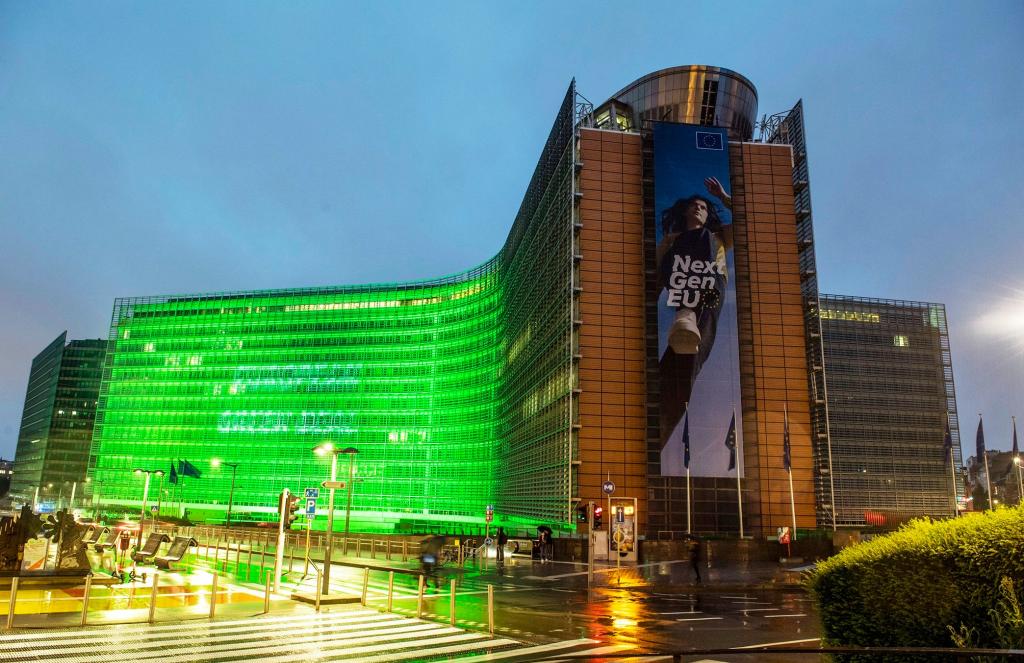Thessaloniki gets ready for its metro launch in November
The underground rapid transit lines have been under construction for almost two decades due to various project delays
 TheMayor.EU logo
TheMayor.EU logo 
The Berlaymont building in Brussels was lit up in green on the eve of the grand announcement , Source: Lukasz Kobus, European Union, 2021
Achieving net emission reductions while balancing between market concerns and social needs
Ursula von der Leyen, President of the European Commission, presented today the EU’s new package of legislative proposals that have been touted as the ‘roadmap’ to achieving climate neutrality in 2050 on the continent. The program, which comes in the wake of the adoption of the European climate law, seeks to streamline and unite, and even tie up, member states, industries and citizens into creating a different and more sustainable kind of economy into the future.
Fit for 55 is the name of the programme, which was widely derided for not bearing a clear message to such a wide audience. The moniker refers to making countries’ economic, trading and energy policies fit for the goal of reducing carbon emission with 55% by the year 2030, as compared to 1990 levels.
By now, we have all become familiar with the European Green Deal as something of a new buzzword and trendy expression. The Commission, however, is aware that getting to climate neutrality will require a lot more than simple wishful thinking and empty words.
That is why, President von der Leyen unveiled concrete actions that would deliver on the targets. In essence, the proposals will enable the necessary acceleration of greenhouse gas emission reductions in the next decade thanks to a deep revision in the bloc’s carbon taxing system.
The proposals combine: application of emissions trading to new sectors and a tightening of the existing EU Emissions Trading System; increased use of renewable energy; greater energy efficiency; a faster roll-out of low emission transport modes and the infrastructure and fuels to support them; an alignment of taxation policies with the European Green Deal objectives; measures to prevent carbon leakage; and tools to preserve and grow our natural carbon sinks.
There is a lot packed in these measures, and it is expected that national governments, industry leaders and civic society groups might have a variety of reactions to the proposals in the near future.
For example, one industry that will be heavily affected is energy production. It accounts for 75% of EU emission so the acceleration to greener energy is crucial if real change is to be made. This, in turn, will be felt in the daily lives of European citizens, who will have to make adjustments in many habits, such as the cars they drive, or even how they think about transport. Likewise, they will have to reorient their ideas about energy consumption – say the way we heat our homes, or how and where we go on holidays.
While in the medium- to long-term, the benefits of EU climate policies clearly outweigh the costs of this transition, climate policies risk putting extra pressure on vulnerable households, micro-enterprises and transport users in the short run. The design of the policies in today's package therefore fairly spreads the costs of tackling and adapting to climate change.
As an answer, a new Social Climate Fund is proposed to provide dedicated funding to Member States to help citizens finance investments in energy efficiency, new heating and cooling systems, and cleaner mobility. The Social Climate Fund would be financed by the EU budget, using an amount equivalent to 25% of the expected revenues of emissions trading for building and road transport fuels. It will provide €72.2 billion of funding to Member States, for the period 2025-2032, based on a targeted amendment to the multiannual financial framework. With a proposal to draw on matching Member State funding, the Fund would mobilize €144.4 billion for a socially fair transition.
In the words of President von der Leyen “the fossil fuel economy has reached its limits” but rather than leaving that stay as a cliché the European Commission has shown today that it can also put actions (and money) to words.

The underground rapid transit lines have been under construction for almost two decades due to various project delays

Now you can get your wine in Talence by paying directly in Bitcoin

That’s because the state has to spend money on updating the railway infrastructure rather than subsidizing the cost of the popular pass

Rethinking renewable energy sources for the urban landscape

The examples, compiled by Beyond Fossil Fuels, can inform and inspire communities and entrepreneurs that still feel trepidation at the prospect of energy transition

Now you can get your wine in Talence by paying directly in Bitcoin

The 10th European Conference on Sustainable Cities and Towns (ESCT) sets the stage for stronger cooperation between the EU, national and local level to fast track Europe's transition to climate neutrality.

At least, that’s the promise made by the mayor of Paris, Anne Hidalgo

The underground rapid transit lines have been under construction for almost two decades due to various project delays

At least, that’s the promise made by the mayor of Paris, Anne Hidalgo

Hostal de Pinós is located in the geographical centre of the autonomous region

Despite its church-y name, the district has long been known as the hangout spot for the artsy crowds

Urban dwellers across the EU are having a say in making their surroundings friendlier to people and the environment.

Forests in the EU can help green the European construction industry and bolster a continent-wide push for architectural improvements.

Apply by 10 November and do your part for the transformation of European public spaces

An interview with the Mayor of a Polish city that seeks to reinvent itself

An interview with the newly elected ICLEI President and Mayor of Malmö

A conversation with the Mayor of Lisbon about the spirit and dimensions of innovation present in the Portuguese capital














